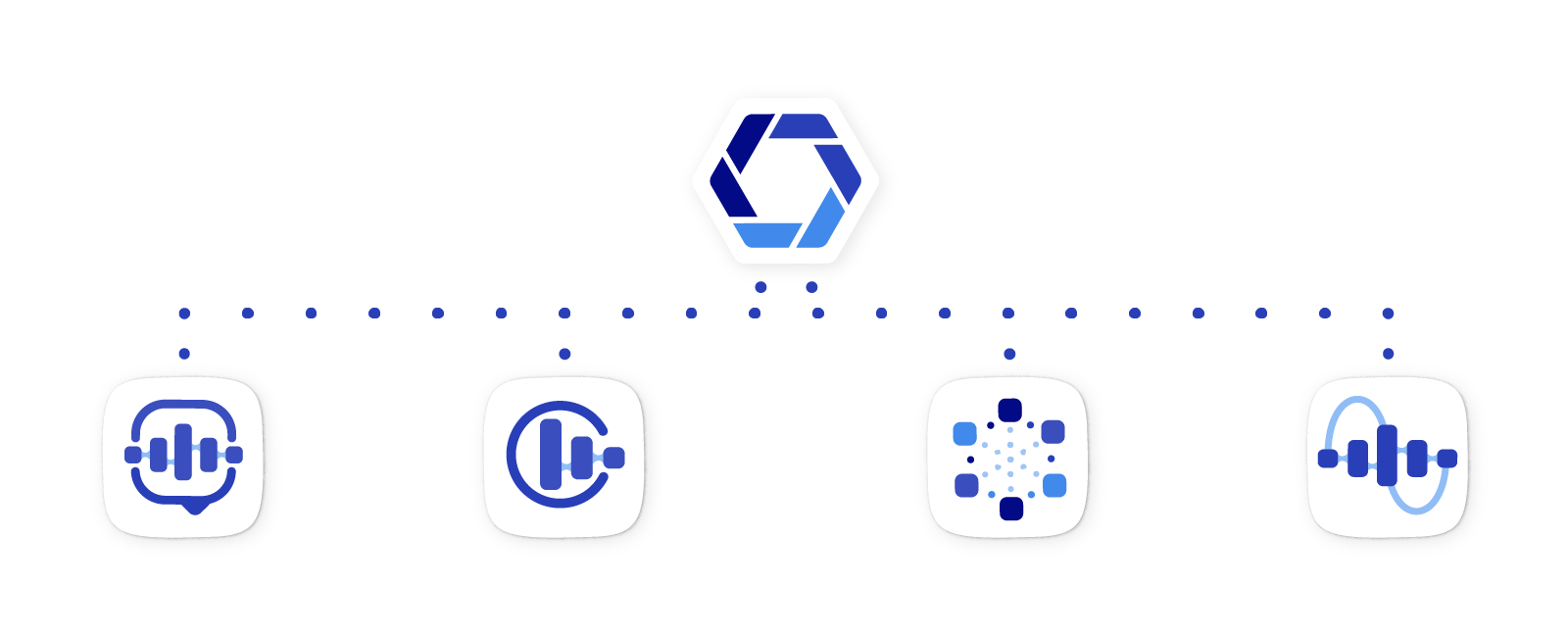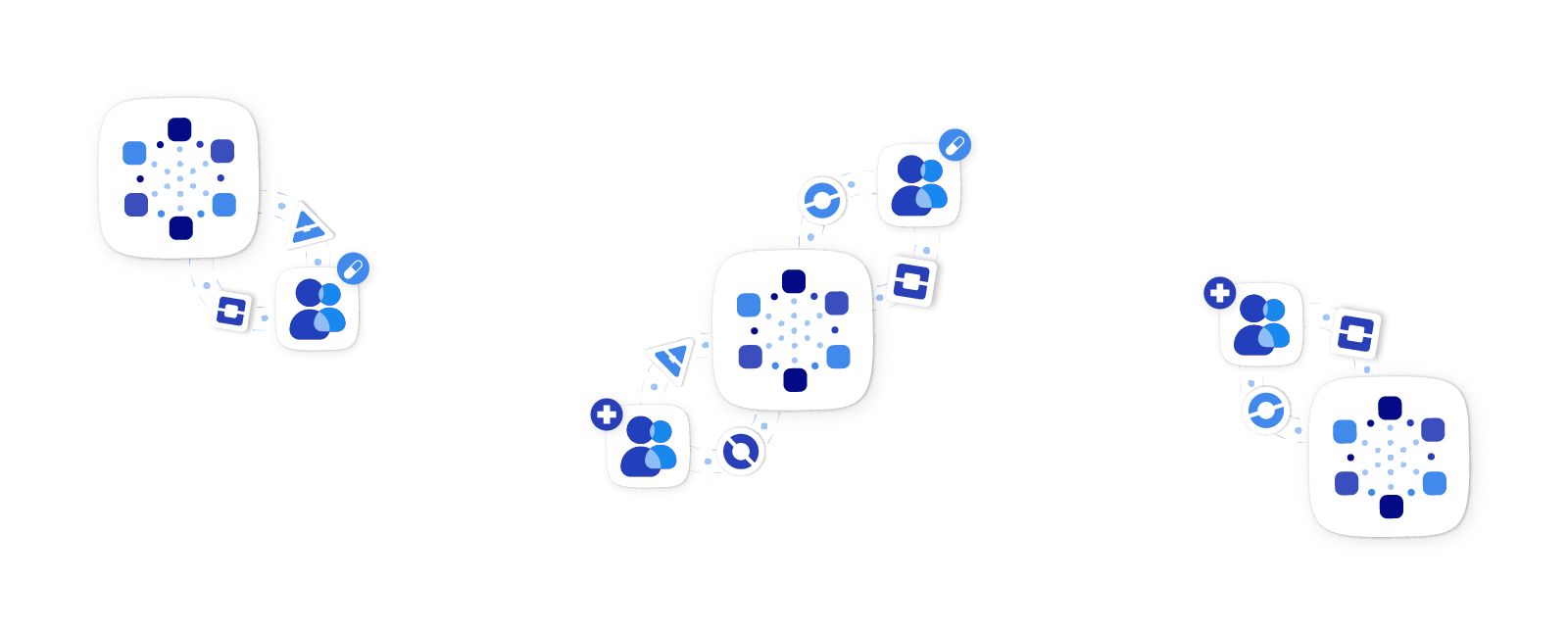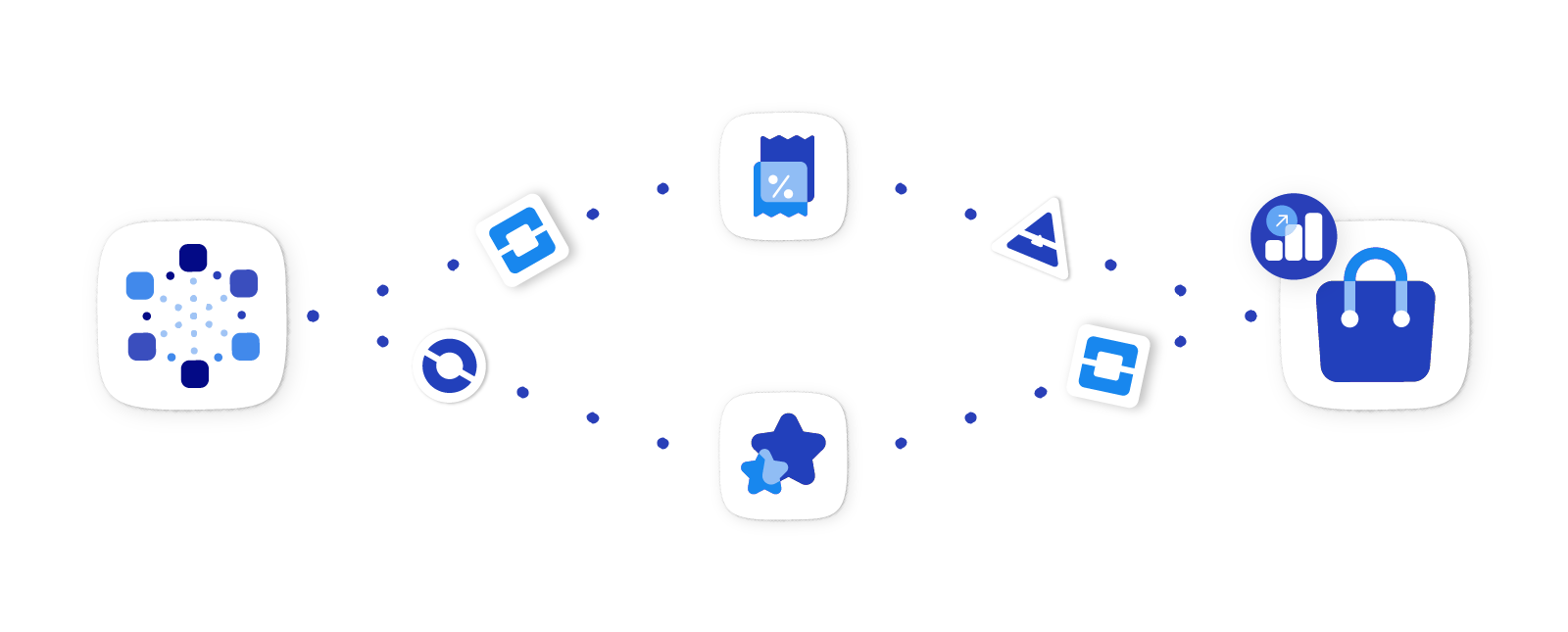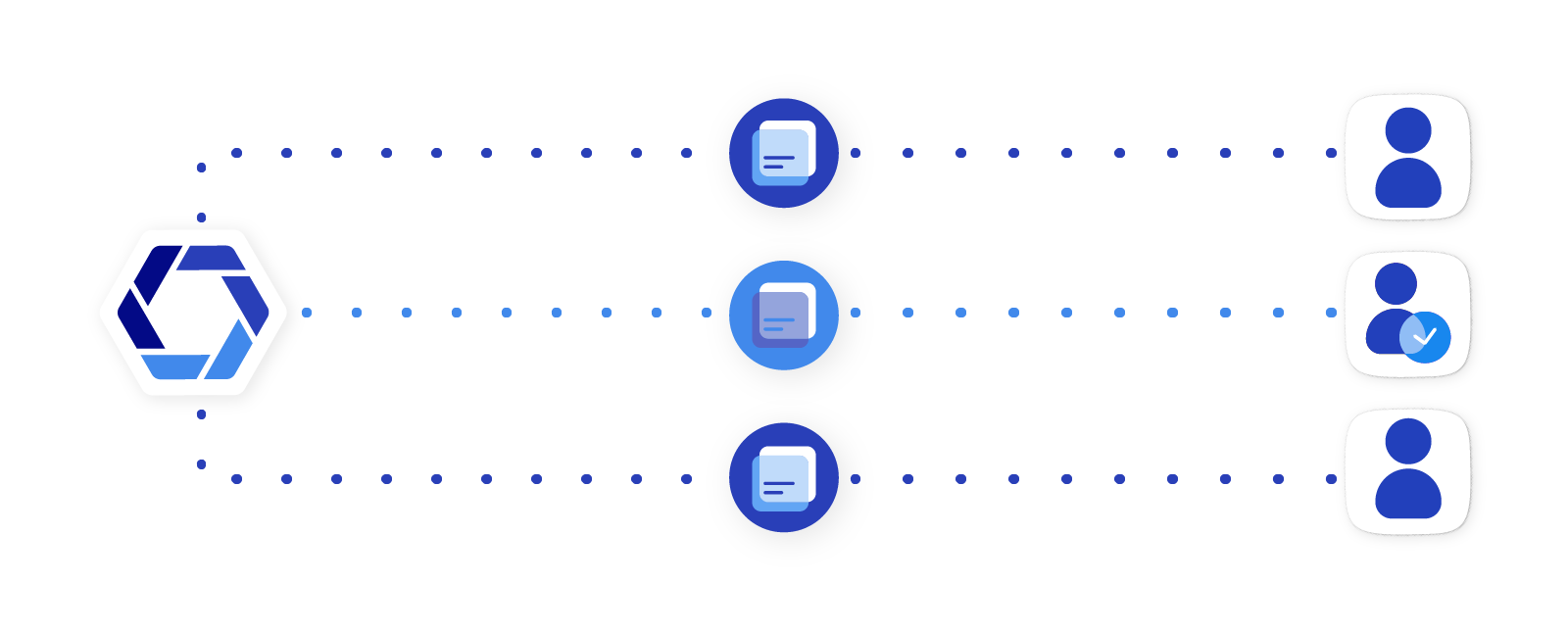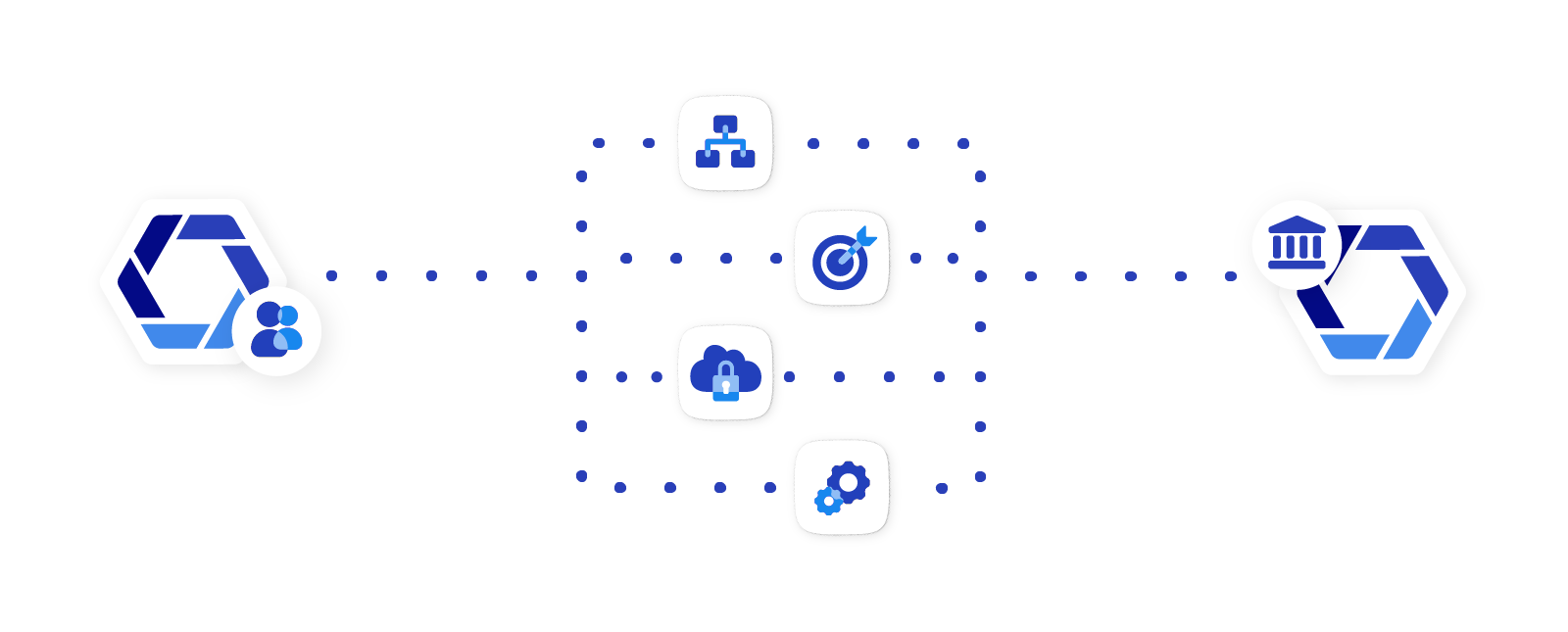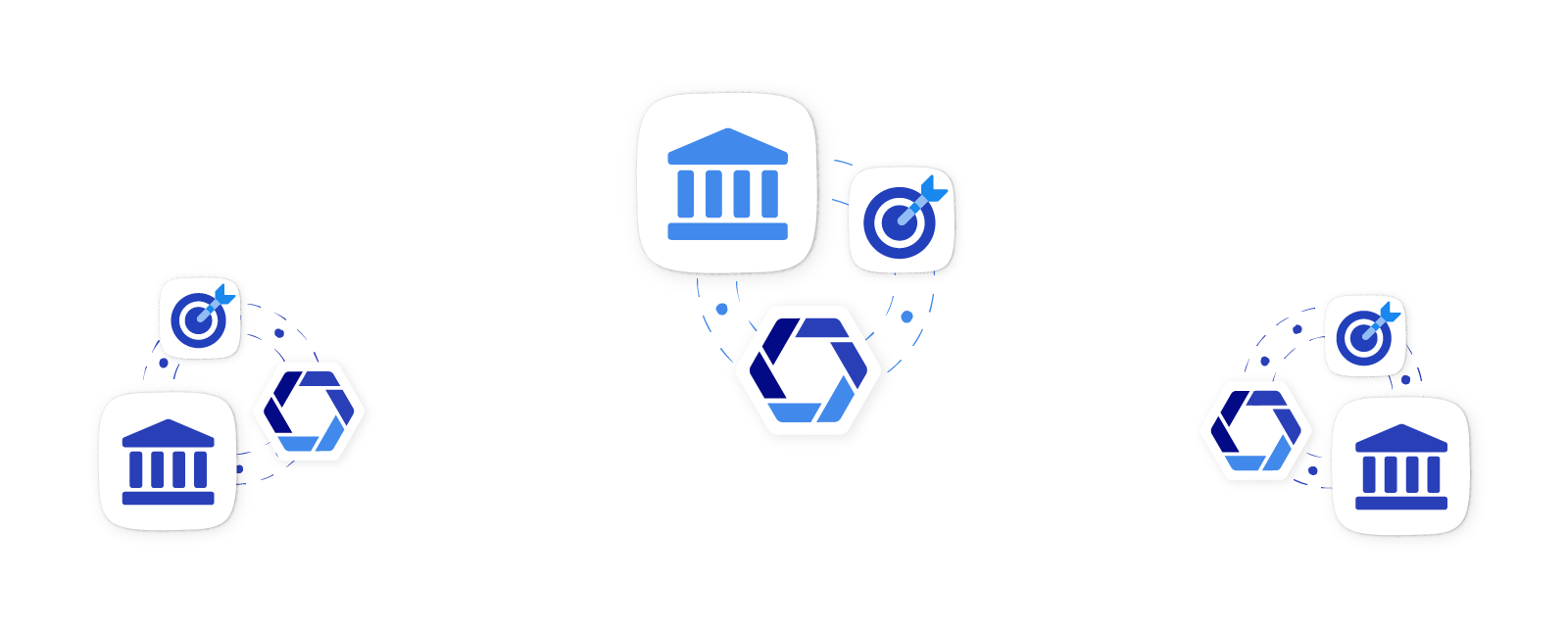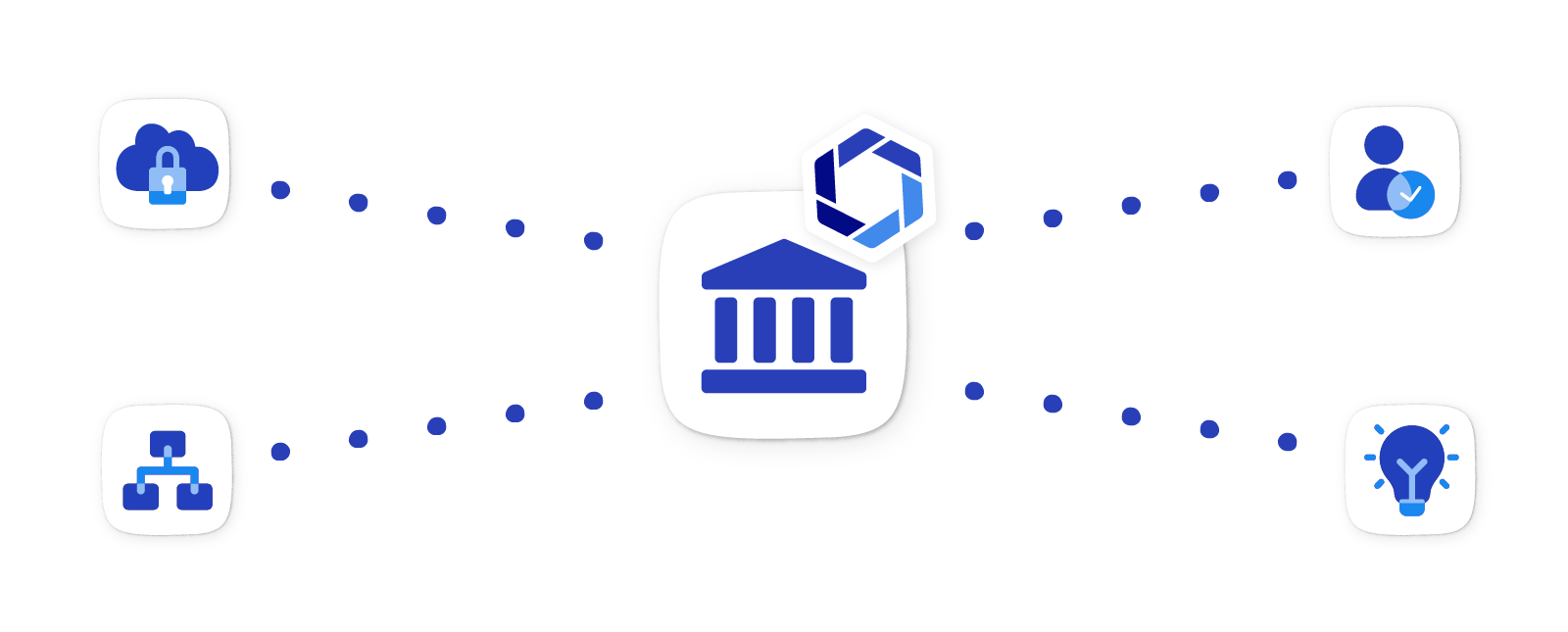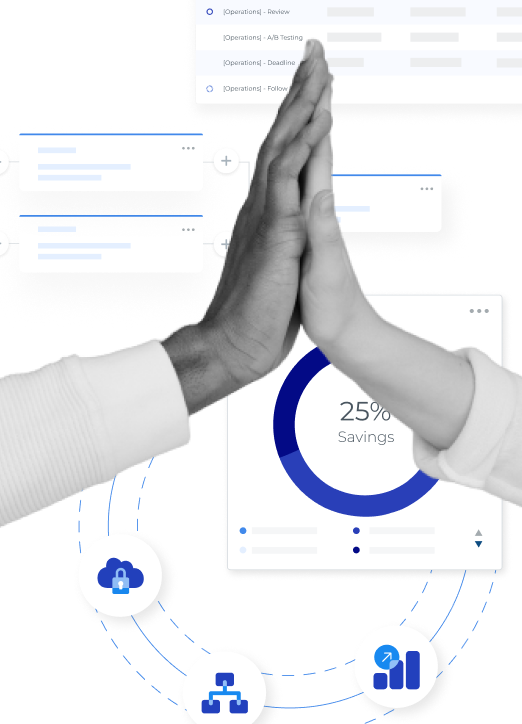Enterprise AI involves using artificial intelligence to automate repetitive tasks, extract insights from large volumes of data, predict future trends, and personalize customer interactions — typically at a much larger scale than the average business.
It’s becoming increasingly crucial in today’s highly competitive and data-driven business landscape. AI allows businesses to operate more efficiently, make more informed decisions, provide superior customer experiences, and stay ahead in the market.
This article will delve deeper into what enterprise AI is, its benefits, applications, and its transformative potential in the modern business world.
What Is Enterprise AI?
Enterprise AI, or artificial intelligence for enterprises, refers to the application of AI technologies in an enterprise business setting. It is intended to enhance productivity, efficiency, decision-making, and other aspects of business operations.
Here are the key components of enterprise AI:
- Machine Learning (ML): ML is a subset of AI that involves the development of algorithms that can learn from and make decisions based on data. In the context of an enterprise, ML can be used to forecast sales, detect fraud, optimize marketing campaigns, and more.
- Natural Language Processing (NLP): NLP is used to understand, interpret, and generate human language in a valuable way. It is often used in customer service bots, sentiment analysis, document summarization, and more.
- Robotic Process Automation (RPA): RPA involves using software robots or “bots” to automate repetitive tasks, thus increasing efficiency and freeing up human workers for more complex tasks.
- Predictive Analytics: It uses historical data, machine learning, and statistical algorithms to predict future outcomes. Businesses use predictive analytics to forecast customer behavior, sales trends, equipment failures, and more.
Enterprise AI encompasses various technologies and applications designed to improve business outcomes. As AI technologies continue to advance and become more accessible, more and more businesses are expected to adopt enterprise AI solutions.
The Benefits of Using Enterprise AI
Enterprise AI presents several benefits that can transform how businesses operate and compete in their respective markets.
One of its main advantages is the increased efficiency and productivity of automating repetitive tasks, allowing employees to focus on more complex and strategic tasks.
Additionally, AI algorithms can analyze vast amounts of data and provide insights and predictions that improve decision-making. In terms of customer experience, AI can significantly enhance engagement and satisfaction through personalized support and recommendations.
Cost savings is another benefit resulting from automation and improved efficiency. These savings, coupled with AI’s predictive capabilities, help businesses avoid costly mistakes and capitalize on opportunities.
By leveraging AI, companies can gain a competitive edge through superior customer experiences, more informed decision-making, and increased operational efficiency. This edge can translate into increased market share and profitability.
AI systems can easily scale to accommodate larger workloads or data volumes, offering flexibility that’s hard to achieve with human-only teams. In risk management, AI can identify and mitigate risks more effectively, such as detecting fraudulent transactions or responding to cybersecurity threats.
By automating routine tasks and providing new insights, AI can also pave the way for innovation, enabling businesses to develop new products, services, or business models.
However, it is essential for businesses to carefully consider the required investment, potential challenges, and change management aspects when adopting enterprise AI. Successful AI implementation is not solely about technology; it also involves organizational cultural and process changes.
AI in the Enterprise
AI has found its way into diverse industries and enterprise applications, driving innovation and efficiency across the board.
Healthcare
AI is reshaping the healthcare industry by providing innovative solutions and augmenting the capabilities of healthcare professionals.
One of the most impactful applications of AI in healthcare is in diagnostics. AI algorithms can analyze medical images such as X-rays, MRI scans, and CT scans to detect anomalies and diseases, sometimes with equal or better accuracy than human radiologists.
AI can also analyze patient records and other data to predict disease progression and personalize treatment plans. For instance, machine learning models can predict the likelihood of readmission for patients with chronic diseases, enabling proactive care and management.
Moreover, AI plays a crucial role in drug discovery, accelerating the process of finding new treatments and reducing the associated costs. By analyzing vast amounts of biomedical data, it can help identify potential drug candidates and predict their effects, speeding up the traditionally slow and expensive process of drug development.
In addition, AI-powered chatbots and virtual health assistants are increasingly being used to provide health advice, answer patient queries, and triage symptoms, offering immediate support and reducing the burden on healthcare professionals.
These applications of AI are not only improving patient outcomes but also making healthcare more accessible and efficient.
Finance
AI has emerged as a transformative force in the finance and banking industries as it offers tools and solutions that enhance efficiency, risk management, and customer service.
One of the most significant applications of AI in finance is fraud detection. Machine learning algorithms can analyze patterns in transaction data to identify anomalies and potential fraudulent activity in real-time, protecting customers and financial institutions.
Additionally, AI is used in algorithmic trading. It analyzes vast amounts of market data to predict price movements and execute trades at optimal times, often with greater speed and accuracy than human traders.
In customer service, AI-powered chatbots are increasingly being deployed by banks and financial institutions to handle customer inquiries, provide personalized financial advice, and even perform simple transactions. These tools not only improve customer experience by providing instant, round-the-clock service, but also reduce operational costs.
Moreover, AI plays a pivotal role in credit scoring and risk assessment. By analyzing a broader set of data, it can predict the likelihood of a customer defaulting on a loan more accurately than traditional models, enabling financial institutions to make more informed lending decisions.
These AI applications drive efficiency, enhance decision-making, and revolutionize the customer experience in the finance and banking industry.
Retail
The application of AI in the retail sector has ushered in a new era of customer experience and operational efficiency.
One of the most prominent uses of AI in retail is personalization, where AI systems analyze customer behavior, preferences, and purchasing history to create personalized product recommendations. This enhances the shopping experience, increases customer loyalty, and boosts sales.
AI is also used in demand forecasting. Machine learning algorithms analyze historical sales data and market trends to predict future demand, helping retailers manage inventory more effectively and reduce costs.
In addition, AI-powered chatbots are transforming customer service in retail, providing instant personalized responses to customer queries, and improving overall customer satisfaction.
In the physical retail space, it is being used to enhance in-store experiences. For example, smart mirrors in fitting rooms can suggest outfits, and AI-powered cameras can help manage inventory in real-time.
AI is also used in dynamic pricing, where prices are adjusted instantly based on demand, inventory, and competitor pricing.
From enhancing customer experiences to optimizing operations, AI is revolutionizing the retail industry, providing significant competitive advantages to retailers who embrace it.
Manufacturing
AI has been a game-changer in the manufacturing industry, driving productivity, quality, and efficiency.
A significant application of AI in manufacturing is in predictive maintenance. By analyzing data from machine sensors, AI algorithms can predict equipment failures before they occur, which allows manufacturers to perform maintenance during non-productive times and prevent costly downtime.
AI is also used to improve quality control. Machine learning models can analyze images of products to detect defects, often with higher accuracy and speed than human inspectors. This not only improves product quality but also reduces waste and rework.
Furthermore, AI plays a crucial role in optimizing supply chain operations. AI systems can analyze vast amounts of data from various sources to predict demand, optimize inventory, and manage logistics more effectively. This leads to reduced costs, improved customer service, and increased flexibility.
In the era of Industry 4.0, AI also enables the creation of “smart factories,” where machines and systems can communicate and make decisions autonomously. This level of automation and connectivity can significantly improve efficiency and productivity.
Customer Service
In customer service, AI is playing a transformative role by enhancing customer experience while driving operational efficiency.
AI-powered chatbots are one of the most significant advancements in this area. These virtual assistants can handle various customer inquiries in real time, provide personalized responses, and escalate complex issues to human agents. They can operate 24/7, ensuring customer queries are addressed promptly, thereby improving customer satisfaction.
Additionally, NLP, a subset of AI, enables these chatbots to understand and respond to customer queries in a more human-like manner to create a more engaging and efficient customer service experience.
AI is also being used to analyze customer feedback and sentiment across various channels, including social media, emails, and customer reviews. This allows companies to gain insights into customer preferences and issues and proactively address concerns and improve their products or services.
Furthermore, AI-powered predictive analytics can help anticipate customer needs based on their behavior and interaction history, allowing for more proactive and personalized customer service. For instance, it can predict when a customer might need assistance or is likely to churn, allowing businesses to take preventative action.
Human Resources
AI is transforming human resources (HR) by automating routine tasks and providing valuable insights to drive strategic decision-making.
One of its most prominent applications in HR is in talent acquisition. AI-powered tools can streamline the recruitment process by automating tasks like resume screening and initial candidate assessments. These tools can analyze many resumes quickly and accurately, which reduces time-to-hire and improves the quality of shortlisted candidates.
AI can also help reduce bias in hiring by focusing on objective criteria. In addition, chatbots are used to engage candidates, answer their queries, and keep them updated about the recruitment process.
Beyond recruitment, AI is used to enhance employee engagement and performance management. AI algorithms can analyze employee feedback, engagement survey results, and performance data to identify trends, predict employee turnover, and recommend actions to improve engagement and performance.
Furthermore, AI-powered tools can provide personalized learning and development recommendations to help employees enhance their skills and grow in their roles.
In HR analytics, AI can analyze vast HR data to provide insights into workforce trends and predict future workforce needs, aiding strategic workforce planning.
These applications of AI are making HR more efficient and strategic, enabling HR professionals to focus more on strategic initiatives and less on administrative tasks.
How Businesses Are Leveraging AI to Gain Competitive Advantage
Businesses across various industries leverage AI to gain a competitive advantage by enhancing efficiency, improving decision-making, personalizing customer experiences, and innovating offerings.
AI’s ability to automate repetitive tasks frees up human resources, allowing employees to focus on more strategic and creative tasks. This not only boosts productivity but also reduces operational costs, providing businesses with a competitive edge.
For instance, in the manufacturing sector, AI-powered robots can carry out assembly line tasks more efficiently and accurately than human workers, reducing the possibility of errors and downtime.
AI also enables businesses to make more informed decisions by providing valuable insights derived from analyzing vast amounts of data. Companies can predict market trends, customer behaviors, and potential risks to stay ahead of the competition.
Financial institutions, for example, are using AI to detect fraudulent activities in real-time, helping them avoid significant losses and maintain customer trust.
The use of AI in customer service through AI chatbots and personalized recommendations can significantly enhance the customer experience. Its ability to provide personalized, timely, and efficient service helps companies stand out in today’s customer-centric market.
For example, e-commerce companies use AI to provide personalized product recommendations to improve customer engagement and increase sales.
Moreover, AI opens up opportunities for innovation. It allows companies to develop new products, services, or business models that weren’t possible before. AI-driven innovation can disrupt entire industries, providing a substantial competitive advantage to the innovators.
However, it’s important to note that while AI can provide several advantages, its adoption also comes with challenges, such as data privacy issues, the need for significant investment in technology and skills, and the potential for job displacement. Businesses need to address these challenges strategically to fully leverage its benefits.
Differences Between Consumer AI and Enterprise AI
Consumer AI and enterprise AI are distinct applications of artificial intelligence, each tailored to different needs and audiences.
Consumer AI, aimed at individual users, enhances the personal user experience and is commonly found in everyday products and services.
Its applications range from smartphone features like image recognition and predictive text to virtual assistants like Siri and Alexa, to the recommendation systems used by Netflix and Amazon, and even to autonomous vehicles like Tesla’s self-driving cars. The goal of consumer AI is to make technology more intuitive, personalized, and user-friendly.
Conversely, enterprise AI is designed to optimize business processes, bolster productivity, and support decision-making within organizations. It tackles more complex tasks, usually involving larger volumes of data, and is designed to drive efficiencies and growth in a business setting.
Examples of enterprise AI include customer service chatbots, predictive analytics for sales forecasting, machine learning algorithms for fraud detection, and robotic process automation for repetitive tasks. Its primary objective is to offer strategic advantages by automating tasks, uncovering insights from large datasets, and enabling more informed business decisions.
The key differences between consumer AI and enterprise AI can be categorized under four main areas: scale and complexity, purpose, data privacy and security, and integration.
Enterprise AI typically manages more complex problems and larger datasets than consumer AI. Its purpose is to enhance business outcomes by increasing efficiency, reducing costs, and promoting revenue growth, while consumer AI focuses on improving personal user experiences.
Regarding data privacy and security, enterprise AI usually handles sensitive business data necessitating stringent data security measures, whereas consumer AI, though handling personal data, typically deals with less sensitive information.
Lastly, while enterprise AI necessitates complex integration with existing business systems and processes, consumer AI is designed for ease of use and integration into products or apps.
Understanding their differences is crucial when developing or implementing AI solutions, as the considerations and functionality for consumer AI and enterprise AI can significantly vary.
Pros & Cons of Deploying AI in an Enterprise
Deploying AI in an enterprise comes with a host of benefits and potential challenges. Understanding these pros and cons can help businesses make informed decisions about implementing AI solutions.
Pros
- Efficiency and Productivity: AI can automate repetitive tasks, freeing employees to focus on more strategic tasks. This improves operational efficiency and boosts productivity.
- Enhanced Decision-Making: AI systems can analyze large volumes of data and generate insights to inform strategic decisions. AI can also predict trends and outcomes, helping businesses stay ahead of the curve.
- Improved Customer Service: AI-powered chatbots and personalization algorithms can significantly enhance customer service and engagement. They can provide instant responses, 24/7 service, and personalized interactions.
- Cost Savings: AI can lead to significant cost savings by improving efficiency and reducing errors. It can also predict and prevent costly issues, such as equipment failures or fraudulent transactions.
- Innovation: AI opens up new possibilities for innovation, enabling the development of new products, services, or business models.
Cons
- High Initial Investment: Implementing AI solutions can require a significant initial investment in technology, data infrastructure, and talent acquisition.
- Data Privacy and Security: AI systems often rely on large amounts of data, which can raise concerns about data privacy and security. Businesses must ensure they have robust data protection measures in place.
- Lack of Explainability: AI algorithms, especially deep learning models, can be “black boxes,” making it hard to understand how they arrived at a particular decision. This can be problematic in industries where explainability is important for regulatory compliance or customer trust.
- Job Displacement: AI automation can lead to job displacement, causing social and economic issues. Businesses need to consider strategies for retraining or upskilling employees whose jobs may be affected by AI.
- Dependence on Data: The effectiveness of AI systems depends on the quality and quantity of data available. If the data is biased or inaccurate, the AI system’s decisions could be flawed.
Thus, while AI offers significant benefits to enterprises, it also comes with challenges that must be thoughtfully managed. Successful AI deployment requires a strategic approach that balances the potential gains with the inherent risks.
Examples of Successful AI Implementations in Enterprises
Several enterprises across various sectors have successfully implemented AI to drive efficiency, innovation, and customer satisfaction.
In the healthcare sector, for instance, Google’s DeepMind has made significant strides in applying AI for medical diagnosis. Its AI system can analyze eye scans to detect signs of age-related macular degeneration and diabetic retinopathy, potentially diagnosing these conditions earlier than traditional methods.
In the financial industry, American Express uses AI to detect fraudulent transactions. By analyzing patterns in historical transaction data, its AI system can identify unusual activity to prevent fraud and protect customers.
Retail giant Amazon has extensively deployed AI across its operations, from personalized product recommendations to its cashier-less Amazon Go stores. Its recommendation algorithms analyze individual customer behavior to suggest products they might be interested in, improving customer engagement, and driving sales.
Meanwhile, its Amazon Go stores use AI-powered computer vision and sensor fusion technology to enable a seamless shopping experience without traditional checkout processes.
In the manufacturing sector, Siemens has implemented AI in its gas turbine production process. Using AI to analyze sensor data from its machines, it can predict potential failures and schedule maintenance, reducing downtime and improving operational efficiency.
These examples demonstrate the transformative potential of AI when implemented effectively in an enterprise context. They highlight how AI can enhance decision-making, improve operational efficiency, drive innovation, and elevate the customer experience.
Enterprise AI Platforms
There are several popular enterprise AI platforms available in the market today. Here are a few notable examples:
Kizen
Kizen’s AI-driven platform stands out for its customer-centric approach, designed to streamline sales, marketing, and service workflows. With features like predictive lead scoring, it uses AI to identify high-potential leads, which helps businesses prioritize their sales efforts.
Its customer experience automation feature uses AI to deliver personalized interactions, enhancing customer satisfaction and loyalty. Additionally, Kizen’s platform automates repetitive tasks, freeing up teams to focus on more strategic activities. Its user-friendly interface and seamless integration capabilities make it a practical choice for businesses of all sizes.
IBM Watson
IBM Watson is a versatile AI platform offering a wide range of AI tools for various industry applications.
Known for its natural language processing and machine learning capabilities, Watson can automate customer service, provide predictive analytics, and support decision-making. Its robust data privacy and security features further enhance its appeal for enterprise use.
Watson also offers personalized learning for employees, fostering an environment of continuous learning and upskilling.
Google Cloud AI
Google’s AI platform offers machine learning and AI tools pre-trained for tasks like image and speech recognition. It also provides tools for building custom models. Its standout feature is its scalability, making it a suitable choice for businesses at different growth stages.
Google Cloud AI also integrates well with other Google services, offering a comprehensive solution for businesses.
Microsoft Azure AI
Microsoft’s Azure AI provides a suite of AI services, including machine learning, knowledge mining, and AI-powered bots. The platform integrates well with other Microsoft cloud services, making it a convenient choice for businesses entrenched in the Microsoft ecosystem.
Azure AI’s strength lies in its wide range of applications, from developing AI models to deploying them at scale.
Salesforce Einstein
Salesforce Einstein is an AI platform that integrates seamlessly with Salesforce’s suite of applications. Designed for sales, service, and marketing,
Einstein uses AI to provide predictive insights, automate tasks, and personalize customer interactions. Its ability to work with other Salesforce applications makes it an excellent choice for businesses already using Salesforce.
SAP Leonardo
SAP Leonardo is a comprehensive digital innovation system that combines AI, machine learning, big data, analytics, and IoT services. It’s designed to help businesses transform processes and business models.
Leonardo’s strength lies in its seamless integration with other SAP products, making it a beneficial choice for enterprises already using SAP.
Selecting the Appropriate AI Platform
Each of these platforms offers unique features and benefits that can be leveraged to drive business growth, improve customer satisfaction, and streamline operations. The choice between them will depend on the specific needs, goals, and existing infrastructure of the business.
Selecting the appropriate AI platform for your business is a pivotal decision that can significantly influence your operations and potential for growth.
To ensure the best fit, you first need to clearly understand your business’s specific needs and objectives. Are you primarily aiming to automate tasks, enhance decision-making through predictive analytics, improve customer service, or perhaps a combination of these? The answer will guide your selection toward a platform with the right capabilities.
Consideration should also be given to the ease of use and integration of the platform. A user-friendly platform that can seamlessly mesh with your existing technological infrastructure will minimize disruption and facilitate quicker adoption.
It’s also important to look toward the future; the chosen platform should be able to scale with your business and capable of managing increasing volumes of data and more complex tasks as your business grows.
Security and compliance are also key factors. The platform should offer robust data security measures and, for businesses operating in regulated sectors, aid in adhering to industry-specific regulations.
Support and training from the vendor can also play a pivotal role in your AI journey. Quality vendor support for implementation, troubleshooting, and upgrades, as well as comprehensive training for your staff, are essential for effective use of the platform.
When it comes to costs, consider not just the initial price tag but the total cost of ownership, including implementation, maintenance, training, and potential hardware or software upgrades.
Finally, if possible, taking advantage of a trial period or initiating a pilot project can be invaluable in testing the platform in a real-world setting as it provides a clearer picture of its suitability before committing to a significant investment.
Ultimately, the best AI platform for your business will depend on your specific needs, resources, and goals, so thorough research, engaging with vendors, and potentially consulting an AI or IT expert will help you make an informed decision.
Embracing the Future: The Indispensable Role of Enterprise AI
Enterprise AI has become a crucial component in today’s competitive business landscape. The ability to automate repetitive tasks, provide insightful data analysis, enhance customer service, and drive innovation gives businesses leveraging AI a significant edge over their competitors.
AI’s transformative potential spans across various industries, from healthcare and finance to retail and manufacturing, highlighting its universal applicability and influence.
However, the successful adoption of AI in an enterprise setting is not just about deploying the most advanced technologies. It involves a strategic approach that aligns with the organization’s objectives, considers the business’s unique needs, and integrates AI seamlessly into existing processes and systems.
The right AI platform can make a substantial difference by providing the tools and capabilities needed to fully realize the benefits of AI.
As we move further into the digital age, the role of AI in business will only continue to grow. Therefore, businesses should proactively explore AI opportunities, consider how AI can address their specific challenges and enhance their operations, and take steps toward adopting suitable enterprise AI solutions.
The journey toward AI adoption may seem daunting, but with careful planning, the right support, and a learning mindset, businesses can navigate this path successfully and secure their place in the future of business.
FAQ: Deploying AI in Enterprise Organizations
Deploying AI in enterprise organizations is a significant step toward driving innovation and enhancing competitiveness in today’s digital era. Let’s address some key questions and concerns about the process, benefits, challenges, and best practices for implementing AI in an enterprise setting.
Is AI difficult for enterprises to implement?
Implementing AI in an enterprise setting can indeed present challenges, but they’re not insurmountable.
The process involves more than deploying advanced technologies—it requires strategic planning, investment in data infrastructure and talent, and a change management approach to ensure successful integration with existing systems and processes. It’s also important to consider factors such as data privacy, security, and compliance with industry regulations.
However, these hurdles should not deter businesses. With the right strategy, resources, and expert guidance, enterprises can effectively implement AI, reaping significant benefits in terms of operational efficiency, improved decision-making, customer satisfaction, and competitive advantage.
How long does it typically take to meaningfully deploy AI in an enterprise?
The timeline for deploying AI in an enterprise varies greatly depending on the project’s complexity, the state of the company’s existing data infrastructure, and the specific objectives of the AI initiative. It could take a few months to a couple of years to see meaningful results.
Quick wins can often be achieved with narrowly defined projects, such as automating specific tasks or enhancing a single process. However, more transformative, and company-wide AI initiatives, such as creating a data-driven decision-making culture or implementing advanced predictive analytics, typically require a longer-term commitment and a phased approach.
It’s important to remember that successful AI deployment is not a one-time event but rather a continuous process of learning, iterating, and improving.
How much does enterprise AI usually cost?
The cost of implementing enterprise AI can vary significantly based on the scope and complexity of the project, the state of the company’s current data infrastructure, the need for new hardware or software, and the cost of hiring or training staff.
It could range from thousands of dollars for small-scale projects using off-the-shelf solutions to millions of dollars for large, complex, custom-built AI initiatives.
Additionally, ongoing costs for maintenance, updates, and further development should be factored into the total cost of ownership. It’s important to view the expenditure on AI as an investment, with the potential for significant returns in terms of improved efficiency, enhanced decision-making, increased customer satisfaction, and other strategic advantages.
Why do most AI implementations fail?
AI implementations often fail due to a variety of reasons. A common issue is the lack of a clear, strategic alignment between the AI initiative and the business’s overall goals, leading to projects that may be technologically impressive but do not deliver meaningful business value.
Additionally, insufficient data quality and quantity can hinder the effectiveness of AI systems. Another key challenge is resistance to change within the organization, as successful AI implementation often requires significant operational shifts and workforce upskilling.
Finally, unrealistic expectations about what AI can achieve in a short time can lead to disappointment and perceived failure. Successful AI deployment requires strategic planning, investment in quality data, change management, and realistic goal setting.
Can I upgrade/integrate my existing technology using AI?
Yes, integrating AI with your existing technology is not only possible but also a common approach for many businesses. Rather than replacing entire systems, AI can often be used to enhance and optimize the existing technological infrastructure.
For instance, AI can be implemented to automate repetitive tasks, streamline workflows, or improve data analysis within your current systems. The key is to ensure seamless integration, which might require professional assistance or choosing AI solutions compatible with your current technology.
However, it’s important to note that the effectiveness of AI integration may be limited if your existing technology is outdated or lacks the necessary capabilities to support AI functionalities.
How does AI impact enterprise agility?
AI can significantly enhance enterprise agility, the ability of a business to respond quickly and effectively to changes in the environment. By automating routine tasks, AI frees up time for employees to focus on more strategic, value-added activities. Its advanced analytics and predictive capabilities can provide real-time insights and foresight about market trends, customer behavior, and operational performance, enabling quicker, data-driven decision-making.
Furthermore, AI-powered tools like chatbots and recommendation systems can rapidly adjust customer interactions based on changing needs and preferences. Thus, by enhancing operational efficiency, improving decision-making, and enabling real-time responsiveness, AI can play a critical role in boosting enterprise agility.
What’s an “AI-Driven Enterprise”?
An AI-driven enterprise is a business that leverages AI at its core to enhance its operations, decision-making, and customer interactions. It integrates AI into its systems and processes to automate tasks, derive insights from data, predict trends, and personalize experiences.
In an AI-driven enterprise, AI is not just an add-on tool but a fundamental part of the business strategy and culture. It implies a commitment to data-driven decision-making, continuous learning, and innovation.
AI-driven enterprises are often characterized by improved efficiency, agility, and customer-centricity, and they are better equipped to adapt to changes and stay competitive in the digital age.


